
Universiti Teknologi MARA (UiTM) Arau Campus and
UTAR collaborated to hold a research
colloquium discussing on youth and family. The colloquium titled “Kolokium
Penyelidikan UiTM-UTAR: Belia dan Keluarga” was held on 14 July 2021 via
Google Meet.
The colloquium kicked off with the first
presentation by Chairperson of UTAR Tun
Tan Cheng Lock Centre for Social and Policy Studies (TCLC) Assoc Prof Dr
Chin Yee Mun. Based on his survey conducted on 485 respondents, ranging from
18 to 35 years old, it was found that nearly two-third of the respondents
believe singlehood gives them more freedom in life and marriage increases
one’s financial commitment. “As the youths climb up their social tier, the
size of family tend to decrease,” said Dr Chin, contrasting to the idea that
suggest financial constraint reduces the interest to form a family.
Some observations through surveys also found that
youth does not see marriage as the sole key to happiness, while also being a
source of burden. Being single is seen as a key to freedom. The changing
view on marriage is believed to be the impact of social changes in their
lives, promoting individualism where life satisfaction with less
responsibility is prioritised.
Dr Chin suggested that Malaysia is heading to a
depopulation. This is due to the social changes led by the development
process. While the social and economic factors play role, the fertility rate
of Malaysians also saw a decrease from 6.3 percent (1958) to 1.8 percent
(2018). He calls for more in-depth research on youth as they are the future
generation.
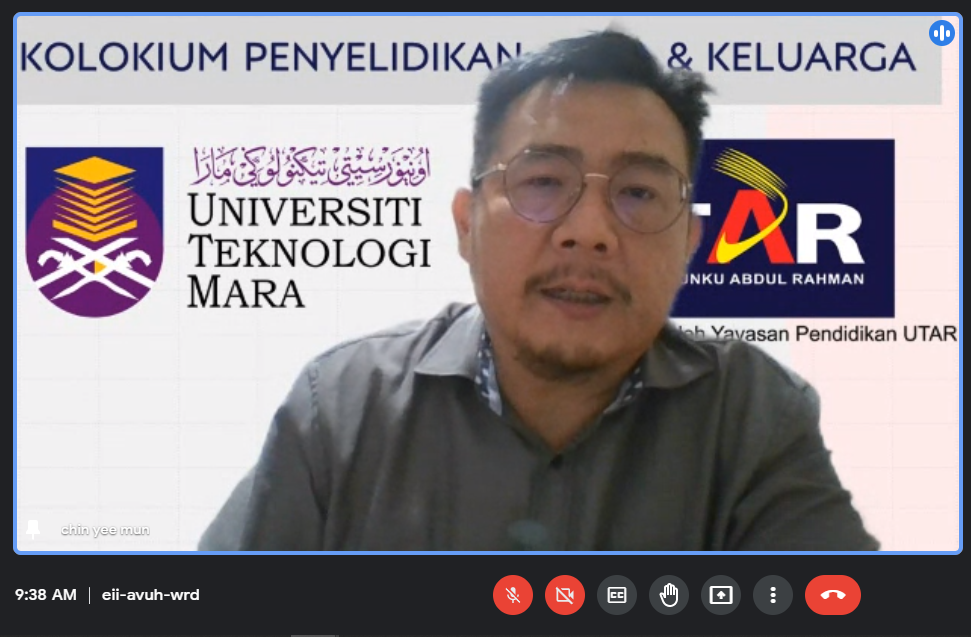
Dr Chin found that less than half (41.8%) of the
respondents plan to get married
In the second session, the colloquium turned to
education to address the changes in teaching and learning experience due to
the Covid-19 pandemic. “We have changed a lot in education where lecturers
and students do not have to be in the campus to conduct or attend a class,”
said UiTM Faculty of Computer and Mathematical Science Ts Noorfaizalfarid
Mohd Noor. His presentation explained the application of heutagogy; a
self-determined learning, a student-centered instructional strategy that
emphasises the development of autonomy, capacity and capability in
long-distance learning.
Despite the changes in the learning method, the
fundamental concept of a teacher, students, two-way communication and
conveying messages to students remain the same. In fact, the change helps to
reduce the cost and saves time.
The youth are very open and adaptive to the
changes in the new norm. “They are young so they adapt faster to the
changes. We cannot refuse open and distance learning (ODL) at this point. It
is crucial and it requires us instead to change to fit in,” said Ts
Noorfaizalfarid, referring to fellow academics.
As one of the suggestions to improve the teaching
and learning experience, Ts Noorfaizalfarid urged universities to focus on
improving e-learning platforms as the students readied themselves for ODL.
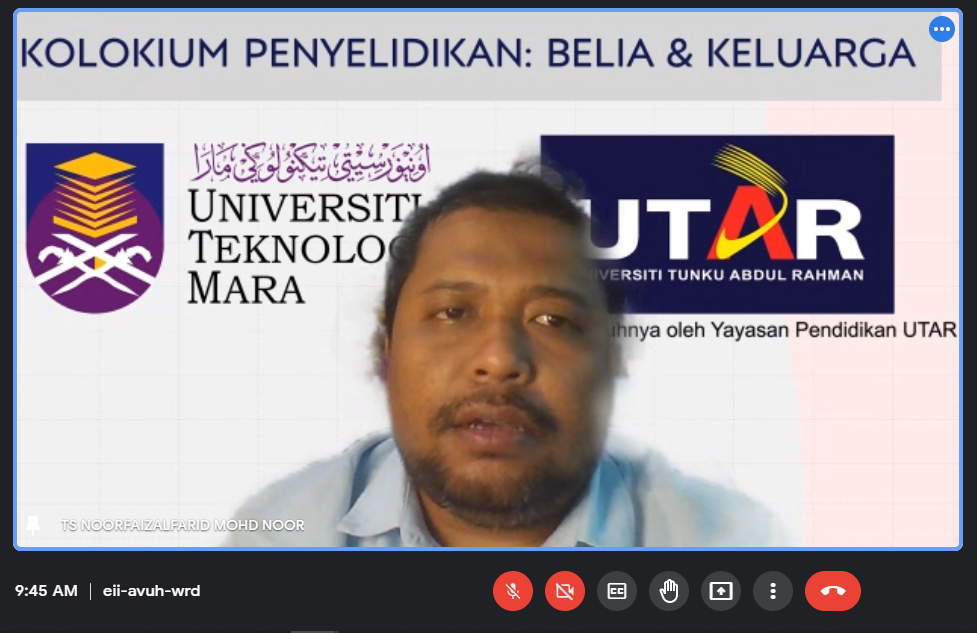
Ts Noorfaizalfarid asserted that the platforms for
online learning was ready for us, but the question was whether we are ready
for it or not
The Covid-19 pandemic remained in the highlight as
the colloquium continued with a presentation that touched on how the
pandemic had affected mental health and quality of life in family context.
UTAR Faculty of Creative Industries Dr Charanjit Kaur Darshan Singh raised
the concern on how being stucked at home can lead to serious issues in a
family, “Many times we do not talk about
emotion (in a family). We talk about current affairs, work, study but not
about how we feel. Though this could lead to ticking time emotional bomb, it
is still not discussed.”
The situation is not made any
better as the pandemic is seen to have weaken the mental health of society
in general. Being stuck at home or longing for physical social interaction
causes anxiety, stress, sorrow, anger and many more negative emotions. With
family around, can they be the helping hand for the members to cope with the
negative emotions?
However, evading to talk about mental health does
not mean the family members do not love each other. According to Dr
Charanjit, parents love their kids and this can be proven through the care
that they give. However, there is a lack of focus on the emotional control
and mental health. “This may have to do with the culture of the East,” she
said, referring to the culture where everyone carries their own emotion
without any open discussion, despite living under one roof.
The Ministry of Health provides
mental health service through four institutions, 1,001 clinics, 66 hospitals
and 28 community mental health centre (Mentari) throughout the countries.
These, however, will not solve the issues if the basic steps are not taken.
“If the family institution itself does not discuss mental health, how could
the family expect to join counseling sessions that are prepared? With the family members ridiculing mental health
issues, how would any of them seek professional help?”
questioned Dr Charanjit. The research is still ongoing with 45
participants.
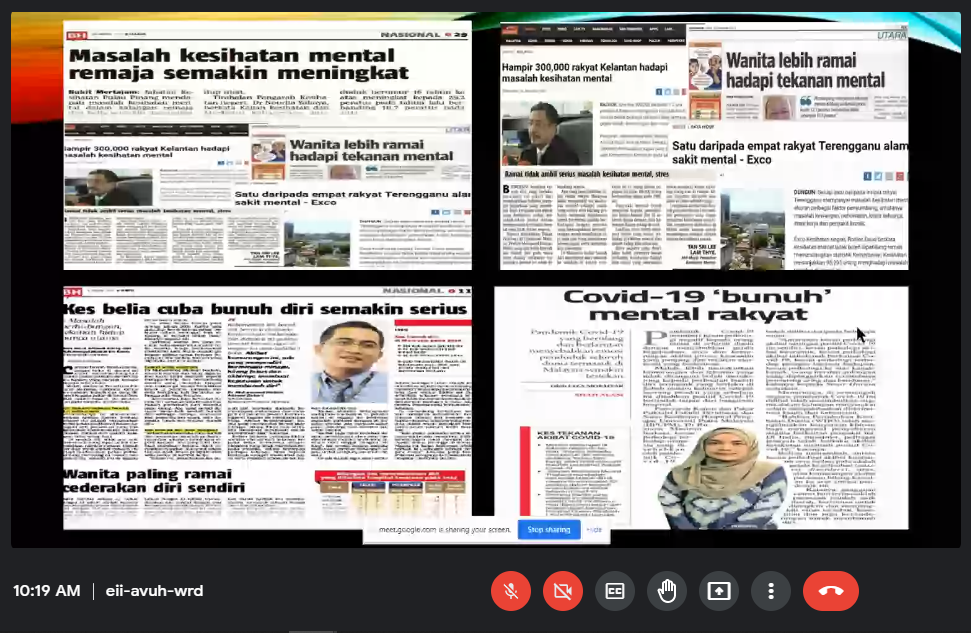
Media have been frequently discussing mental
health issues
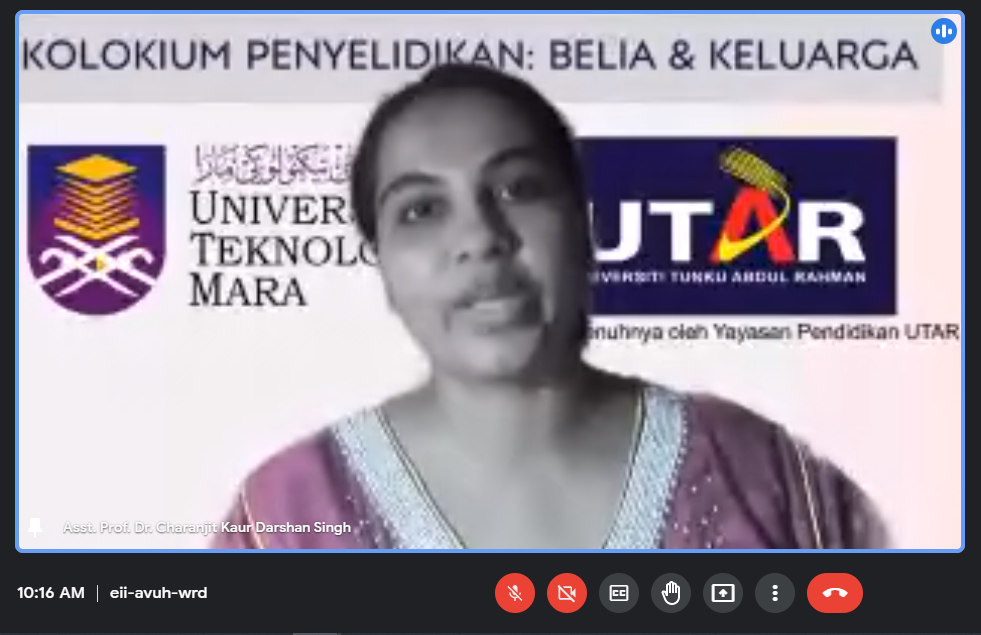
According to Dr Charanjit, the
quality of family relationship is based on two aspects, namely social
support and tension
The colloquium that was attended
by more than 100 participants reached its final session when UiTM Islamic
Affair Senior Lecturer Nadiyah Hashim brought the focus to the methodology
of dissolvement of marriage in Islamic perspective. “Divorce cases saw an
increment during the pandemic. However, the pandemic only added fuel to the
fire. Even before that, financial issues has always been the main factor,”
said Nadiyah.
Divorce has many names and
methods in Islam, which include talak
(husband divorcing wife verbally),
fasakh (wife requesting for a divorce for eligible reasons),
khuluk (wife compensates husband to divorce her),
zihar (husband symbolising wife to
those he is not allowed to be married to) and a few more.
According to Nadiyah, the
increasing number of cases also increased the burden of the Syariah court of
the country. However, it is still manageable and most of the issues are in
the fasakh cases and validation of
talak. “Many problems occur when
the people do not understand the procedure. They wish to hasten the process
but end up prolonging it due to issues that arise,” said Nadiyah.
To improve the situations faced
by all stakeholders, Nadiyah listed a few suggestions. These include the
need for husband and wife to understand their rights in the cases, and the
procedure of the Syariah law. As
for the court, she suggested the appointment of
hakam, a mediator that has strong
knowledge in the procedure and law involving both the husband and wife.
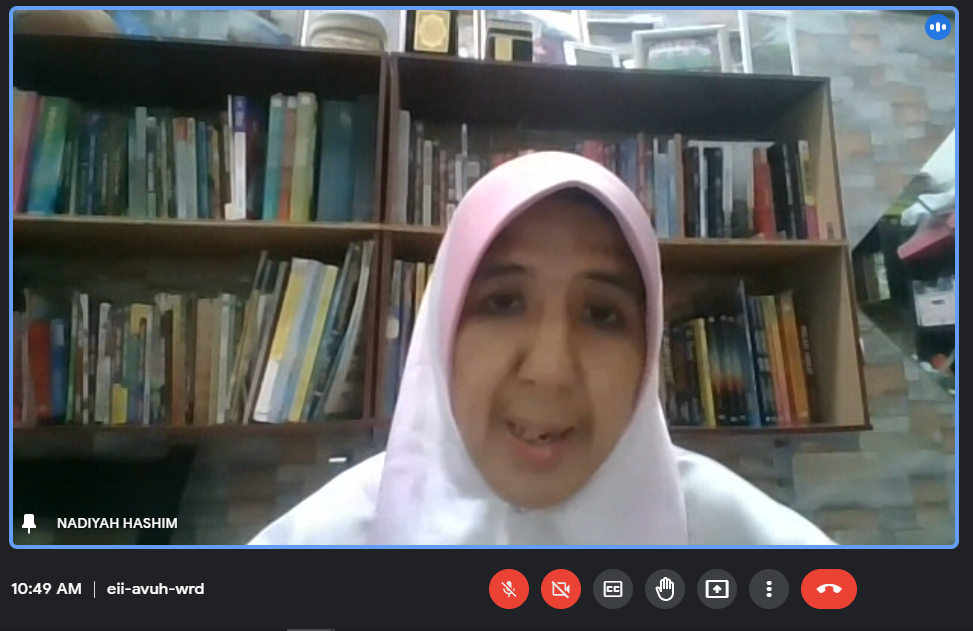
Nadiyah reminding audiences to
consider divorce as the last resort to marriage problems
The three-hour colloquium came to
an end with a speech from UTAR Vice President for R&D and Commercialisation
Prof Ts Dr Faidz bin Abd Rahman. Prof Faidz believed that the topics
discussed were relevant to the challenging times, especially now, “I am glad
that we touched on youth dan family issues. They are important and the
topics discussed are ones that require serious attention as the nation
struggles through the pandemic. The big question is what is our contribution
to the fight against the crisis? There are ways to contribute, and voicing
out ideas for solutions is one of it.”
Wholly owned by UTAR Education Foundation (200201010564(578227-M)) LEGAL STATEMENT TERM OF USAGE PRIVACY NOTICE